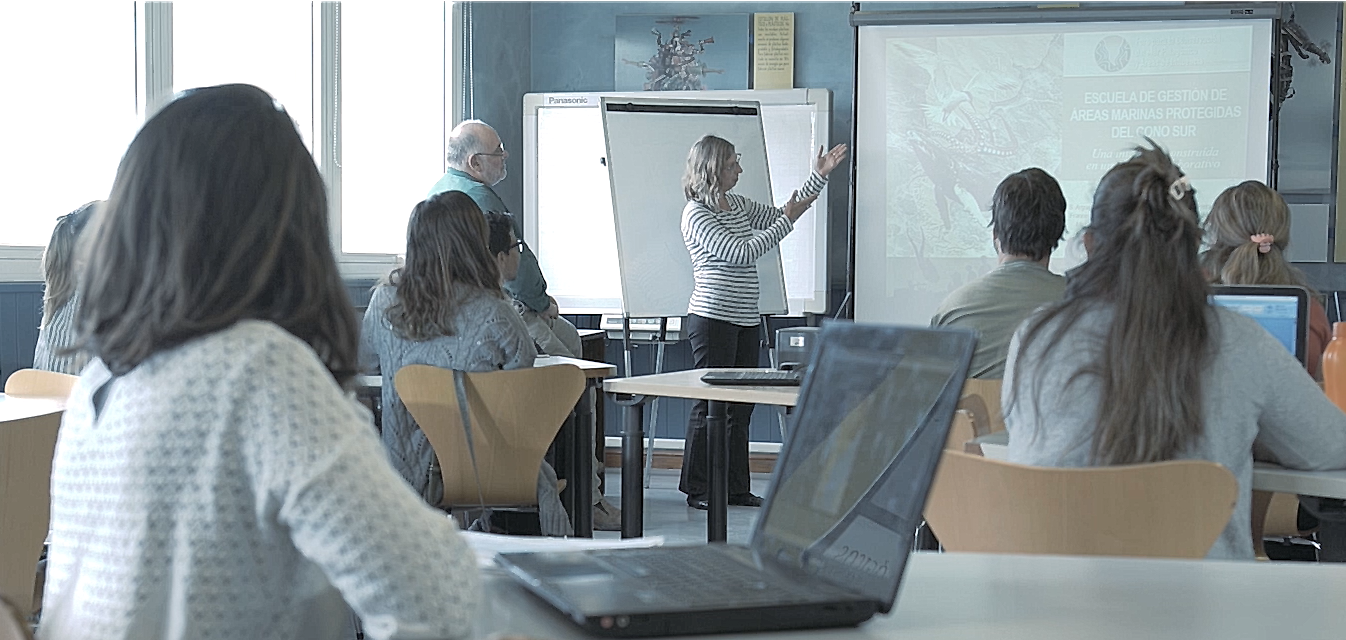-
The third cycle of the School for Marine Protected Areas’ Managers is about to start. The MPA School is a training program that seeks to strengthen the skills of those responsible for managing the Marine Protected Areas (MPAs) of the region.
-
The initiative was launched in 2017 by several conservation organizations, under the framework of the Forum for the Conservation of the Patagonian Sea, and further supported by the governments of Argentina, Chile and Uruguay.
-
Through collaborative work, and with a regional approach, the initiative achieved the strengthening of the organizations involved through the training of the staff in charge of MPAs planning and management, thus positively impacting on MPAs of the Southern Cone.
The Southern Cone countries continue to take steps towards the strengthening of national strategies in order to protect the marine biodiversity, such as the creation of Marine Protected Areas (MPAs). However, the need to improve current MPAs management and contribute to the proper design and management of future MPAs is still present. One of the strategies we propose in order to attain this goal is to offer transdisciplinary training and education for those responsible for the management of said conservation units.
Pursuing this goal, the School for Marine Protected Areas’ Managers launched its third cycle, in which it will try to develop the skills needed to face the challenge of forging alliances with different MPA-related institutions. Since 2017, the School offers its first group of students different courses aimed at strengthening the basic skills for efficient MPA managing. To date, several topics have been taught, among them: evaluating management’s efficiency, managing projects, and designing and implementing management plans. As a direct result of the previous cycles, the effectiveness of 15 MPAs, in terms of planning and management, was positively affected, not to mention that a regional community of students was brought together.
The 2020 programme was specifically designed in response to the common needs of all three countries, and it will cover 3 crucial areas of knowledge for the design and forging of MPA management alliances: institutional and legal knowledge, communication, and participatory processes. The course is divided into 3 modules: the first will take place between April and July through the Argentinian National Parks Administration’s virtual platform. Whether the next two modules are going to be taught online or not is still uncertain, given the current pandemic context.

A regional framework
A comprehensive training programme is efficient and achieves such an impact tailored for the characteristics of the Southern Cone temperate seas, which need to be thought out with a dynamic outlook, and with an adaptable and regional approach. “We will keep on working and bringing together the countries’ capabilities for the School to continue growing towards becoming a continuous training mechanism that covers the current and future needs for teams trained in effective management of MPAs”. So concludes the letter of intention signed by the representatives of the three countries’ governments and some civil society organizations, signed during the 3rd Congress on Protected Areas of Latin America and the Caribbean, which took place in Peru in 2019.
The School, which is part of the integrated efforts of the Forum for the Conservation of the Patagonian Sea, is coordinated by WCS Chile, WWF Chile and Fundación Vida Silvestre Argentina. The School has the support of the Chilean Department of Environment, the Argentinian National Parks Administration, and the Department of Housing, Land Management and Environment of Uruguay. In 2020, it will also be supported by the French Agency for Biodiversity.